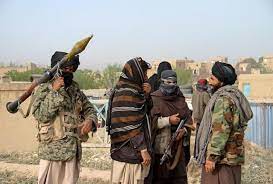Islamabad, Sept 5:The fragile ceasefire between the outlawed Tehreek-e-Taliban Pakistan (TTP) group and law enforcement agencies is holding despite sporadic attacks by the dreaded terror outfit, a media report said on Monday.
Negotiations for peace with the TTP to end the nearly two decades of conflict in the tribal districts bordering Afghanistan have been on hold since the last delegation, composed largely of tribal leaders, held a round of talks towards the end of July, the Dawn newspaper quoted officials familiar with the process as saying.
“There has been no movement. Everything is on hold,” the paper quoted an official as saying.
Recently, questions were raised over the fate of peace talks after it was reported that armed militants had returned to Swat, Dir, and parts of the tribal districts of Khyber-Pakhtunkhwa province.
While there was no public comment from the government, returning militants claimed they had done so following an agreement. However, sources familiar with the talks in Kabul said no such agreement had taken place.
“The only ‘agreement’ was about an indefinite ceasefire and continuation of negotiations to settle complex issues, including the return of the militants and their reintegration in society,” the official said.
“The demand from our side was that the TTP was to be disbanded and they would return unarmed. Of course, they didn’t agree, much like we didn’t agree to some of their demands,” he explained.
The TTP continues to insist ever since the May ceasefire agreement that it had acted in self-defence whenever and wherever it was attacked, resulting in the death of policemen in Dera Ismail Khan and Peshawar.
The ceasefire agreement, they say, stipulates that both sides including the law enforcement agencies are free to act in self-defence, although in a recent post the militant group accused “the other side” of violating the terms.
There is little clarity as to who is carrying out attacks and which group is behind the increasing number of extortion calls.
The TTP denies its involvement and has asked victims to report such incidents but analysts say that public anxiety and concerns will only grow in the absence of clarity and transparency involving the peace talks and the understanding reached.
Little is known as to what was said or agreed upon between the TTP leadership and senior Pakistani interlocutors during the talks brokered by and held under the direct supervision of the acting Afghan Taliban Interior Minister, Sirajuddin Haqqani.
A team of religious scholars led by Mufti Taqi Usmani — someone who is revered and respected both within the ranks and file of the Afghan Taliban and the TTP, was sent to assure the militant leadership that there was nothing “un-Islamic” about the Constitution of the Islamic Republic of Pakistan.
There were some indications that considerable headway had been made leading to optimism amongst some circles that an agreement was around the corner.
However, soon after reports of the presence of armed militants in the tourist hotspot of Swat emerged, sparking fears of a renewed phase of violence after more than a decade of peace and normalcy in the region.
The attack on a Pakistan Tehreek-e-Insaf (PTI) lawmaker from Dir in early August was the first such indication.
The attack that left the lawmaker critically injured and four others dead, was, however, denied by the TTP.
However, police and security officials strongly believed TTP militants on their way from Afghanistan to Swat via Dir carried out the ambush to punish the lawmaker for heading the Village Defence Committee in his native district that had overseen the surrender of some militants to the state. (PTI)
Home International Ceasefire still on between TTP and Pakistanlaw enforcement agencies despite attacks


